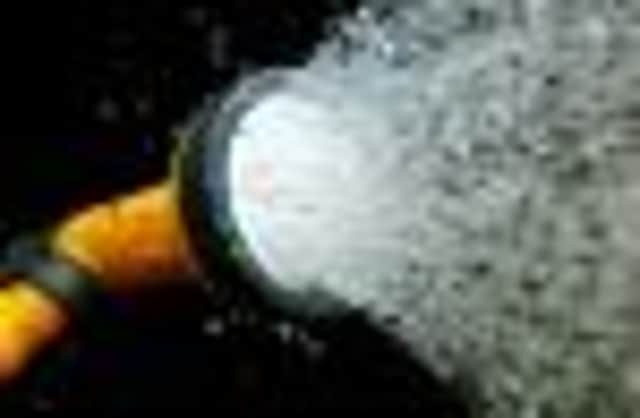Hose pipe ban begins in England


Millions of householders across southern and eastern England will be banned from using hosepipes from today as drought grips parts of the country.
Seven water companies are introducing restrictions on water use following one of the driest two-year periods on record, with domestic customers facing a £1,000 fine if they use their hosepipe in defiance of the ban.
Advertisement
Hide AdAdvertisement
Hide AdThames Water, Southern Water, South East Water, Anglian Water, Sutton and East Surrey, Veolia Central and Veolia South East are bringing in the restrictions today, affecting about 20 million people.
Anglian Water’s director of water services Paul Valleley said “weeks and weeks of rain” would be needed to bring an end to the hosepipe ban.
Mr Valleley said: “We’re trying incredibly hard to make sure we meet our water leakage target this year.
“We’ve employed an extra 62 people to look for leaks and we’ve got over 60 gangs out every single day repairing leaks whenever we possibly can.
“We’re absolutely focused to minimise leakage. We realise that any leakage is basically unacceptable.
“We’re really hoping customers will understand the need for this ban and will work with us to make sure they minimise the use of water in the home generally, not just using a hosepipe.
“We’re hoping people’s conscience will really lead them to decide that using a hosepipe in these circumstances is not the right thing to do.
“We need weeks and weeks of solid rain to overcome this problem and end the ban any time soon.”
Advertisement
Hide AdAdvertisement
Hide AdCustomers will no longer be able to use their hosepipes for watering their gardens, washing cars or boats, hosing down patios and paths, and filling swimming pools, ponds, fountains and paddling pools. Public parks and allotments will also be hit.
The firms insist they are necessary to preserve essential water supplies and protect the environment, in the face of drought which has left groundwater below 1976 levels in some places and rivers running dry.
Despite some rain in the past few days, March was another dry month and the whole of the South East and East Anglia and parts of Yorkshire are officially in a state of drought.
The Environment Agency said most reservoirs were now below normal levels and river flows were decreasing. All rivers are experiencing lower than normal flows, with two-thirds “exceptionally” low.
The Environment Agency has urged companies to do more to tackle leakage rates.
Water companies across England and Wales leaked more than 3.3 billion litres a day in 2010/11, according to Ofwat, the economic regulator of the water and sewerage industry. Anglian and Southern were among the companies to fail to meet their water leakage targets last year.
Thames Water sustainability director Richard Aylard rejected claims that Thames Water leakage rates are “obscene”.
He said: “They are not obscene, they are high - partly a consequence of very old pipes, 20% of London’s water pipes are over 150 years old.
Advertisement
Hide AdAdvertisement
Hide Ad“With this ban we would expect to see up to 150 million litres of water a day saved. To get the same saving from replacing leaky pipes would cost £1.2 billion and take 10 years so we have to be practical about this.
“Replacing pipes costs £400 a metre of pipe replaced so we have to get this in balance, it has to be done over time.”
He added that the ban was likely to continue until autumn unless we have a “phenomenally wet” summer.